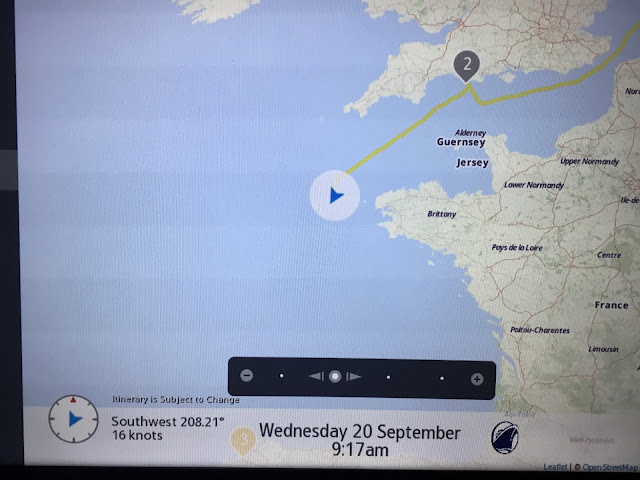Today we get down and dirty
and get to play with sharp knives and fun kitchen gadgets again ... living on the edge!
There are only 12 people in
today’s class which is again held in the ships Culinary Arts Center.
The class is featuring
entrees or little plates and we are going to do 3 dishes.
Dish one
(still need to find out what Cava is? it was a darkish, dry white wine perhaps sherry)
Serves 4
20 sea scallops
Oil to fry
1 ½ cups dry cava or other sparkling wine
Pinch of saffron threads
1 cup cream
1 whole vanilla bean
Lemon juice to taste
Minced fresh parsley
A little oil in a heavy large skillet over medium – high heat, add scallops and sauté either side for color, set aside.
Sauce
In the
same skillet over medium – high heat, add Cava and saffron and boil to
reduce by ½ approx. 7 mins.
Add cream, vanilla pod cut lengthways and scrape the seeds into the cream.
Boil until reduced to a
sauce consistency, about 10 mins.
Season to taste with lemon
juice, salt and pepper.
Return scallops to sauce
just to heat through.
Plate scallops drizzle with
sauce then sprinkle with parsley and some lemon for freshness.


Pete we cannot read with black writing on dark background.
ReplyDeleteThe white writing on dark background is a dream.
Other than that I just love the photo of you two in the ships galley. Keep up the good work. HIT THE SEAS HAS THE WHITE FONT ON DARK background. Please check it out.
From Wikipedia:
ReplyDeleteCava (Catalan pronunciation: [ˈkaβə], plural caves) is a sparkling wine of Denominación de Origen (DO) status from Catalonia, also produced in other regions of Spain. It may be white (blanc) or rosé (rosat). The macabeu, parellada and xarel·lo are the most popular and traditional grape varieties for producing cava. Only wines produced in the champenoise traditional method may be labelled "cava"; those produced by other processes may only be called "sparkling wines" (vinos espumosos). About 95% of all cava is produced in the Penedès area in Catalonia, with the village of Sant Sadurní d'Anoia being home to many of Spain's largest production houses. The two major producers are Codorníu and Freixenet. Cava is also produced in other villages in Aragon, Castile and León, Extremadura, La Rioja, Basque Country, Navarre and Valencia.
In the past, cava was referred to as "Spanish champagne", which is no longer permitted under European Union law, since Champagne has Protected Geographical Status (PGS) and Spain entered the EU in 1986. Colloquially it is still called champán or champaña in Spanish or xampany in Catalan. Today it is defined by law as a "quality sparkling wine produced in a designated region" (Vino Espumoso de Calidad Producido en una Región Determinada, VECPRD).
Cava is an important part of Catalan and Spanish family tradition and is often consumed at celebrations like baptisms, marriages, banquets, dinners and parties.
well good morning Marilyn and welcome, THANK YOU for the help with Cava ... now!!! was that research done in lunch time on a non government computer !!!!
ReplyDeleteCheers Lindsay, opps technical issues this end or to much vino !!!!
ReplyDelete